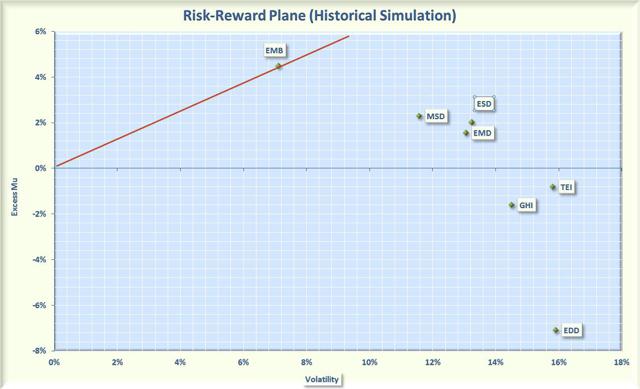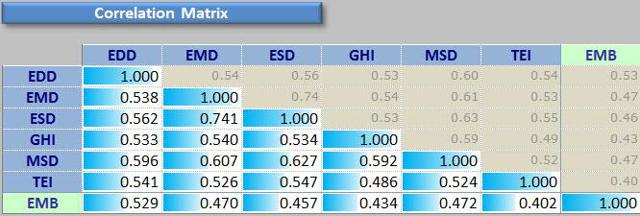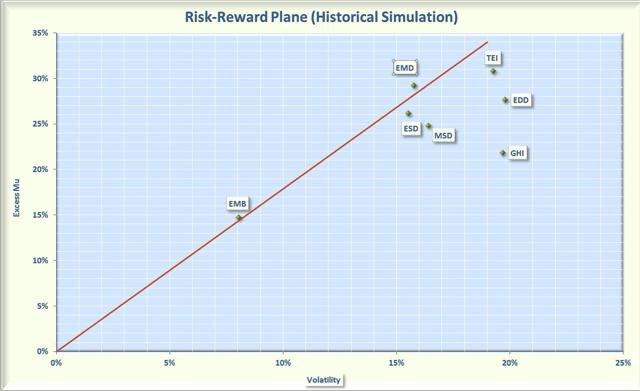Over the past several weeks, I have been writing about potential bargains among Closed End Funds (CEFs). This week I will continue the series by analyzing the risks and returns associated with Emerging Markets (EM) Bond CEFs. Before jumping into the analysis, I will provide a quick review of some of the characteristics of this asset class.
The term emerging market refers to securities domiciled in a country that is considered to be emerging from an under-developed economy to a more mainstream environment. These countries are typically in Africa, Eastern Europe, the Middle East, Latin America, and some Asian countries. Many of these economies depend on either exporting commodities or providing services to the more developed world. There are several subclasses of EM bonds. For example, EM bonds may trade in either the currency associated with their country or trade in U.S. dollars. In addition, EM bonds may be corporate bonds or government treasuries (which are usually referred to as sovereign debt).
Some of the reasons for investing in the bonds of emerging markets include:
- EM bonds offer higher yields than comparable bonds from developed countries.
- As the credit worthiness of an emerging economy improves, the rating of the bonds may improve leading to capital gains.
- EM bonds rise and fall due to local conditions, which may not be in sync with the U.S. market, thus offering diversification.
- If the EM bond is denominated in local currency, there is a potential for additional appreciation due to currency fluctuations. Of course, depreciation is also a possibility (which has happened recently).
Since many EM bonds are thinly traded and are available only on local exchanges, it is difficult for individual investors to purchase these bonds individually. The easiest way to invest in this asset class is to buy funds. Exchange Traded Funds (ETFs) are the most popular vehicle with some ETFs trading over 700,000 shares per day. However, Closed End Funds (CEFs) are an alternative choice. The closed nature of these CEFs makes it easier for the manager to invest and hold limited liquidity assets without having to worry about cash inflows and outflows. However, the downside of CEFs is that the price is based on market action, which can wreak havoc when the asset falls from favor. This has been demonstrated with a vengeance since the second quarter of 2013 when talk of the Fed increasing rates led to a collapse of prices of these CEFs.
As prices deteriorated, the discounts of these CEFs widened to historical large levels, many over 18%. This is evidenced by a large negative Z-score, a statistic popularized by Morningstar to measure how far a discount (or premium) is from the average discount (or premium). The Z-score is computed in terms of standard deviations from the mean so it can be used to rank CEFs. A Z-score lower (more negative) than minus 2 is a relatively rare event, occurring less than 2.25% of the time. However, in today's environment, most of the EM CEFs have a one year Z-score of negative 2 or lower, which illustrates the current lack of demand for these CEFs.
There are several reasons that investor lost confidence in emerging markets:
- The dollar has been in a bull market, which means that emerging markets currencies are becoming weaker versus the dollar. The Fed may finally begin to tighten in the near future, which will again strengthen the dollar.
- Commodities are in a bear market and many emerging market economies depend on the sale of commodities. When commodities swoon, so do these economies, putting pressure on their bonds.
- China is the largest emerging market and turmoil in China has crushed some of the lesser economies
Has the rout in emerging markets gone too far? I believe in the wisdom of Warren Buffet when he opined: "Be greedy when others are fearful." I am not clairvoyant and have no idea how long it will take the EM bonds to recover. Some bonds may default, but on a whole I believe a diversified basket of EM bonds will be a smart investment. If you decide to invest in this type of bond, the question is: what are the "best" funds to purchase?
There are many ways to define "best." Some investors may use total return as a metric but as a retiree, risk is as important to me as return. Therefore, I define "best" as the asset that provides the most reward for a given level of risk and I measure risk by the volatility. Please note that I am not advocating that this is the way everyone should define "best"; I am just saying that this is the definition that works for me.
This article will compare the risks and rewards of EM bond CEFs. I will use a 5-year time frame and require that the selected funds trade an average of 50,000 shares or more per day. Based on these criteria, I included the following CEFs for my analysis:
- MS Emerging Markets Domestic (EDD). This CEF invests in emerging market domestic debt and sells for a discount of 18%, which is a much larger discount than the 5 year average discount of 10.1%. The one year Z-score is minus 2. This is the only leveraged fund that invests exclusively in local currency debt. The fund has 46 securities, almost all in sovereign debt. Even though the bonds are from emerging markets, about 67% are actually investment grade (BBB or higher). The fund invests in a wide range of countries including Brazil (16%), Mexico (16%), South Africa (16%), Malaysia (15%), Poland (14%) and Turkey (14%). The fund utilizes 31% leverage and has an expense ratio of 2.2%. The distribution rate is 12.5 %, which is funded by income with some Return of Capital (ROC) in one quarter over the past year. The Undistributed Net Investment Income (UNII) is negative and is large when compared to the distribution, which is a concern.
- MS Emerging Markets Debt (MSD). This CEF sells for a discount of 18.5%, which is a larger discount than the 5 year average discount of 10.8%. The one year Z-score is minus 2.6. The fund has 115 holdings, with about 51% in sovereign debt and 46% in corporate bonds. Virtually all the bonds are denominated in U.S. dollars. Geographically, the holdings are distributed among a large number of countries including Mexico (13%), Indonesia (11%), Venezuela (7%), and Turkey (7%). About 41% of the bonds are investment grade. MSD uses 8% leverage and has an expense ratio of 1.2%. The distribution is 6.6% with no ROC.
- Western Asset Emerging Markets Debt (ESD). This CEF sells at a discount of 18.3%, which is a larger discount than the 5 year average discount of 8.6%. It has 240 holdings with 51% in sovereign debt and 42% in corporate bonds. The assets are distributed among several countries including Mexico (13%), Indonesia (11%), Turkey (7%), and Venezuela (7%). About 69% of the portfolio is investment grade. The fund uses 16% leverage and has an expense ratio of 1.2%. The distribution is 9.1%, consisting primarily of income and some ROC (about 10% of the distribution). UNII is negative but is less than one month distribution.
- Western Asset Emerging Markets Income (EMD). This CEF sells for a discount of 18.5%, which is a larger discount than the 5 year average discount of 8.6%. The one year Z-score is minus 2.2. The fund has 235 holdings with 53% in sovereign debt and 42% in corporate bonds. About 73% of the holdings are investment quality. The assets are distributed among several countries including Mexico (12%), Indonesia (9%), Turkey (9%), Netherlands (6%), and Peru (5%). The fund utilizes 14% leverage and has an expense ratio of 1.3%. The distribution is 8.5%, consisting primarily of income with about 30% ROC but the UNII is positive.
- Global High Income Fund (GHI). This CEF sells for a discount of 13.6%, which is a larger discount than the 5 year average discount of 7.3%. The one year Z-score is only minus 0.1. The fund has 308 holdings, with 66% in sovereign debt and 26% in corporate bonds. All the holdings are denominated in U.S. dollars. The holdings are distributed among a large number of countries including Brazil (11%), Turkey (7%), Indonesia (8%), Mexico (6%), and Russia (5%). About 38% of the holdings are investment grade. This fund does not use leverage and has an expense ratio of 1.4%. The distribution is 10.9%, consisting primarily of income and ROC. The ROC occurred in about 60% of the months over the last year and comprised about 30% of the distribution. The UNII is positive.
- Templeton Emerging Markets Income (TEI). This CEF sells at a discount of 17%, which is a larger discount than the 5 year average discount of 1.5%. The one year Z-score is minus 2.4. This fund has 119 holdings with 56% invested in sovereign debt, 24% in corporate bonds, and 13% in short term debt. The securities are distributed across many countries including Iraq (11%), Indonesia (11%), Zambia (10%), Hungary 990%), and UAE (8%). The fund does not utilize leverage and the expense ratio is 1.1%. The distribution is 8.1%, consisting of income with no ROC.
For comparison, I will also include the following ETF:
- iShares J.P. Morgan USD Emerging Markets Bond (EMB). This ETF is a passive fund that tracks an index made up of U.S. dollar denominated emerging market bonds. The country allocations are rebalanced monthly, based on the amount of outstanding debt. The fund has 287 holdings with 78% in sovereign debt and 21% in corporate bonds. About 62% of the portfolio is investment grade. The holdings are spread across a large range of countries including Russia (6%), Philippines (6%), Turkey (5%), Indonesia (5%) and Mexico (6%). Overall, 28 countries are represented. The fund has an expense ratio of 0.40% and yields 4.5%.
To assess the performance of the selected CEFs, I plotted the annualized rate of return in excess of the risk free rate (called Excess Mu in the charts) versus the volatility of each of the component funds over the past 5 years. The risk free rate was set at 0% so that performance could be easily assessed. This plot is shown in Figure 1. Note that the rate of return is based on price, not Net Asset Value (NAV).
Figure 1. Risk versus reward over the past 5 years.
The plot illustrates that the CEFs have booked a wide range of returns and volatilities over the past 5 years. To better assess the relative performance of these funds, I calculated the Sharpe Ratio. The Sharpe Ratio is a metric, developed by Nobel laureate William Sharpe that measures risk-adjusted performance. It is calculated as the ratio of the excess return over the volatility. This reward-to-risk ratio (assuming that risk is measured by volatility) is a good way to compare peers to assess if higher returns are due to superior investment performance or from taking additional risk. In Figure 1, I plotted a red line that represents the Sharpe Ratio associated with EMB. If an asset is above the line, it has a higher Sharpe Ratio than EMB. Conversely, if an asset is below the line, the reward-to-risk is worse than EMB. Note also that Sharpe Ratios are not meaningful if a stock has a negative return.
Some interesting observations are evident from Figure 1.
- The CEFs were substantially more volatile than the ETF. This was expected since CEFs are actively managed, may use leverage, and may sell at discounts or premiums. All of these attributes tend to increase volatility.
- The EM CEFs did not have great performance over the period. EM bonds have been in a bear market since 2013 and the prices associated with CEFs decreased faster than Net Asset Value . Since EMB is an ETF that does not sell at a discount, EMB has much better risk-adjusted performance than any of the CEFs.
- Looking only at the CEFs, MSD had the best performance followed by ESD and EMD. The other three CEFs were underwater for the period.
Next I wanted to see if the diversification promised by these emerging markets bonds lived up to expectation. To be "diversified," you want to choose assets such that when some assets are down, others are up. In mathematical terms, you want to select assets that are uncorrelated (or at least not highly correlated) with each other. I calculated the pair-wise correlations associated with the selected funds. The results are provided in Figure 2. As is evident from the figure, these CEFs provided relatively good diversification with correlations in the 50% to 60% range. Thus, these CEFs did provide good portfolio diversification.
Figure 2. Correlation over past 5 years.
The 5 year look-back data shows how these funds have performed in the past. However, the real question is how they will perform in the future when the bull market in EM debt returns. Of course, no one knows, but we can obtain some insight by looking at the most recent bull market period from March 2009 to January, 2013. Figure 3 plots the risk-versus-reward for the funds over this bull market time frame.
Figure 3. Risk versus reward during a bull market
As expected, all the funds had excellent performance over this bull market period. The CEFs all had higher absolute returns than EMB but were also significantly more volatile. When volatility was taken into account, EMB was still a leader in risk-adjusted performance. However, during the bull market, EMD matched EMB in risk-adjusted performance and ESD, TEI, and MSD were not far behind. EDD and GHI continued to lag the other funds.
Bottom Line
If you are a risk-adverse investor who wants to diversify into emerging market bonds, EMB would be your best bet. However, if you want to take advantage of the wide discounts associated with CEFs, I would recommend ESD, EMD and MSD. These three CEFs had good performance over the entire 5 year period plus will likely excel if the bull returns. When this asset class returns to favor, I would expect the discounts to revert back to the mean and this would provide some capital gains to go along with attractive distributions. But beware, emerging markets CEFs are not for the faint hearted.


